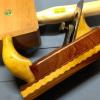Hello everyone,
This is my first post here as I am completely new to woodworking. I've been trying to build a set of hand tools, but have been having trouble choosing/finding my first hand plane. I was hoping some of you could offer me some advice...
For me, woodworking will be just a hobby and I hope to do smaller projects (like cutting boards and boxes) at least for the time being. My research has led me to consider a low angle block plane as my first plane, but a smoothing or jack plane has also been recommended to me. Does anyone have additional opinions about this? Also, what exactly would I use each of these planes for, particularly in the small-scale projects that I'd be working on as a beginner?
If it helps, I'd like to spend less than $40 on my first plane.
Any and all advice is appreciated.




 Reply With Quote
Reply With Quote





